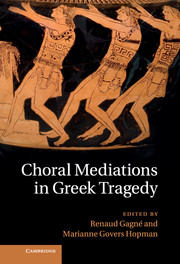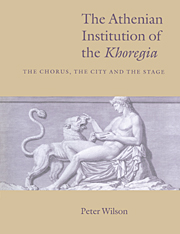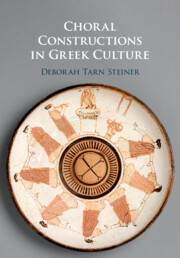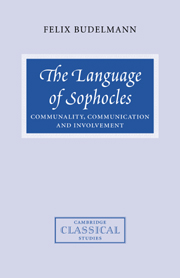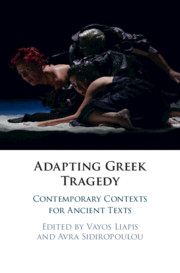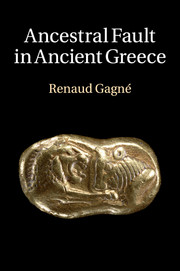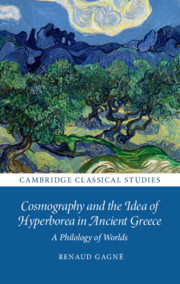Choral Mediations in Greek Tragedy
$46.99 USD
- Editors:
- Renaud Gagné, University of Cambridge
- Marianne Govers Hopman, Northwestern University, Illinois
- Date Published: October 2013
- availability: This ISBN is for an eBook version which is distributed on our behalf by a third party.
- format: Adobe eBook Reader
- isbn: 9781107070134
Find out more about Cambridge eBooks
$
46.99 USD
Adobe eBook Reader
Other available formats:
Paperback, Hardback
Looking for an inspection copy?
This title is not currently available on inspection
-
This volume explores how the choruses of Greek tragedy creatively combined media and discourses to generate their own specific forms of meaning. The contributors analyse choruses as fictional, religious and civic performers; as combinations of text, song and dance; and as objects of reflection in themselves, in relation and contrast to the choruses of comedy and melic poetry. Drawing on earlier analyses of the social context of Greek drama, the non-textual dimensions of tragedy, and the relations between dramatic and melic choruses, the chapters explore the uses of various analytic tools in allowing us better to capture the specificity of the tragic chorus. Special attention is given to the physicality of choral dancing, musical interactions between choruses and actors, the trajectories of reception, and the treatment of time and space in the odes.
Read more- Explores the polyvalence of tragic choruses through a wide range of methodological practices
- Emphasises the complexity of choruses and the need for a flexible approach to the medium
- Discusses all three major tragedians and offers comparisons with lyric and comic choruses
Reviews & endorsements
'Excellent … offers a sophisticated exploration of both the richness and the strangeness of the chorus as a phenomenon of ancient Greek culture.' The Times Literary Supplement
See more reviews'… the elasticity of [its] approach allows the book to offer sixteen diverse but uniformly rich essays that show how the chorus is a mediating figure for scholarly interests as much as it was a figure of shifting meanings on the Athenian stage for its inventors, performers, and observers.' Sarah Nooter, Bryn Mawr Classical Review
'This excellent volume occupies a distinctive place within the growing body of scholarship on the Greek chorus. It will be of great interest to scholars working on Greek tragedy and on ancient performance culture more broadly.' Lauren Curtis, The Classical Journal
Customer reviews
Not yet reviewed
Be the first to review
Review was not posted due to profanity
×Product details
- Date Published: October 2013
- format: Adobe eBook Reader
- isbn: 9781107070134
- contains: 5 b/w illus. 3 maps
- availability: This ISBN is for an eBook version which is distributed on our behalf by a third party.
Table of Contents
1. Introduction: the chorus in the middle Renaud Gagné and Marianne Hopman
2. Choral polyphony and the ritual functions of tragic songs Claude Calame
3. Chorus, conflict, closure in Aeschylus' Persians Marianne Hopman
4. Choral intertemporality in the Oresteia Jonas Grethlein
5. Choreography: the lyric voice of Sophoclean tragedy Simon Goldhill
6. Conflicting identities in the Euripidean chorus Laura Swift
7. The choral plot of Euripides' Helen Sheila Murnaghan
8. Transcultural chorality: Iphigenia in Tauris and Athenian imperial economics Barbara Kowalzig
9. Maenadism as self-referential chorality in Euripides' Bacchae Anton Bierl
10. The Delian maidens and their relevance to choral mimesis in Classical drama Gregory Nagy
11. Choral persuasions in Plato's Laws Lucia Prauscello
12. The comic chorus and the demagogue Jeffrey Henderson
13. Dancing letters: the Alphabetic Tragedy of Kallias Renaud Gagné
14. Choral dialectics: Hölderlin and Hegel Joshua Billings
15. Enter and exit the chorus: dance in Britain, 1880–1914 Fiona Macintosh
16. 'The thorniest problem and the greatest opportunity': directors on directing the Greek chorus Peter Meineck.
Sorry, this resource is locked
Please register or sign in to request access. If you are having problems accessing these resources please email [email protected]
Register Sign in» Proceed
You are now leaving the Cambridge University Press website. Your eBook purchase and download will be completed by our partner www.ebooks.com. Please see the permission section of the www.ebooks.com catalogue page for details of the print & copy limits on our eBooks.
Continue ×Are you sure you want to delete your account?
This cannot be undone.
Thank you for your feedback which will help us improve our service.
If you requested a response, we will make sure to get back to you shortly.
×
